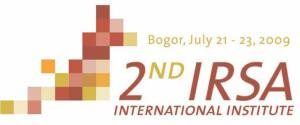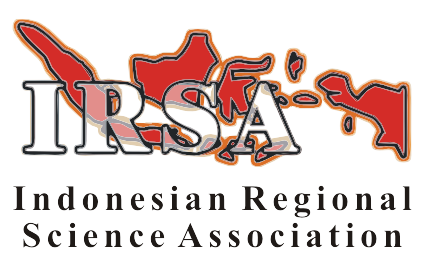The 2nd IRSA International Institute
 22-23 July 2009, Bogor – West Java
22-23 July 2009, Bogor – West Java
The 2nd IRSA International Institute
“The Political Economics of Regional Development”
Chair: D.S. Priyarsono and Ernan Rustiadi
Host: IRSA, IPB (Bogor Agricultural University) and BAPPENAS
Background
Financial crisis in the USA that started last year has become global economic crisis. Recent analysis identifies that Asia is the region where the crisis is hitting the hardest. Sooner or later its impacts will eventually hit Indonesian economy. Exports which contributed 8% to the Indonesian GDP growth in 2007, and 14% in the first semester of 2008, will predictably decrease, especially those to the USA. Consequently, domestic production activities as well as new investments will shrink. These adverse impacts have not been reached their severest levels, but the economic growth has been slow down. Recent data of economic growth rate shows figure (6.2%) that is well below the official government’s target. Understandably, the problems of unemployment and poverty will persist at least in the coming several years. Official data show that unemployment rate (8.46%) and poverty rate (15.4%) are well greater than what have been expected.
When global economy is slow down, it is very reasonable not to rely on exports for boosting economic growth. Instead, domestic demand should become the prime mover for growth. In this spirit, the government has embarked programs for enhancing the economy through various instruments. Fiscal stimulus programs have been launched. Budget for public investment for infrastructure development has increased. Subsidies for agriculture and energy sectors are planned to be more focused. Policies for improving investment climate have been formulated. All of these are efforts to mitigate the negative impacts of the global crisis.
In the new era of “Reformasi”, the spirit of decentralization has become very important in formulating public policies. Economic and political settings in regional level play strategic roles in the nation’s development. Substantially bigger and bigger portion of the national budget has been allocated for provincial as well as municipality/district governments through various schemes. No less than 65% of the national budget has been allocated for local governments to manage.
Unfortunately, the new era so far has not improved the economy. Beside the problems of unemployment and poverty, the problems of interregional as well as interincomegroup disparities tend to get worsened. Threats to food and energy security have not been satisfactorily resolved, if not even getting more serious. Central and local governments are challenged to creatively formulate policies to minimize the adverse impacts on the welfare of the people, the majority of which depend on sectors related to agriculture and natural resources.
It is therefore important to scientifically scrutinize the roles of regional development in the national efforts to solve the problems. More specifically, it is very important to analyze the political and economic setting of regional development that determines the effectiveness of regional governance in boosting the national development.
Objectives
The organization of this event attempts to provide a forum where the participants, scholars as well as practitioners, exchange knowledge, experience, and opinion in healthy debates and discussions. The scope is not limited to scientific issues such as theories and methodologies in Regional Science, but it covers also applied and practical subjects such as public policy formulations and evaluations.
Prior to the sessions of plenary discussions, lectures, and paper presentations, in the first day of the event there will be workshops for training of new tools in regional analysis for young scholars and practitioners.
A book of proceedings containing selected papers presented in this event will be published.
Theme and Topics
In accordance with the aforementioned background, the theme of this event has been formulated as “The Political Economics of Regional Development”. The topics include but are not limited to: Regional Development and the Global Financial Crisis, Regional Competitiveness and Investment Climate, Fiscal Decentralization and Regional Economic Growth, Poverty and Interregional Disparities, Interregional Trade, Central and Local Governments Relationship, Agriculture and Rural Development Policy, Food Policy, Political Economics of General Election and Regional Development, and Public Governance and Regional Development.
Workshops
The Organizer has invited an international expert on Panel Data Analysis to deliver a lecture on the first day of the event. It will be followed by discussion sessions and laboratory works. Optimal number of seats for participants attending this is twenty for a topic.
IRSA members and other scholars and practitioners are welcome to offer other topics of workshops. The Organizer will facilitate the program by informing the plan to potential participants and arranging the classrooms.
Sessions of Lectures, Keynote Speeches, and Paper Presentations
The Organizer has invited prominent guests to deliver lectures and keynote speeches on the relevant topics. General audiences are invited to submit papers to be featured and discussed in the special sessions of paper presentations.
Expected Participants
Considering the number of participants in the past nine IRSA international meetings (in Jakarta, Yogyakarta, Malang, Bali, Bandung, Palembang), it can be expected that approximately 300 persons will attend the planned event in Bogor. Most of them are members of IRSA or regular attendants of IRSA international conferences including graduate students, university lecturers and professors, researchers, and practitioners in the fields of regional science, from domestic cities as well as from abroad.
Practitioners of regional science include government officials from various agencies such as the National Development Planning Agency (BAPPENAS), Department of Public Works, Department of Transportation, Department of Communication and Information, Department of Agriculture, and others. Officials from provincial as well as municipality/district governments also attended IRSA conferences.
Participants from business sectors, both private and public companies are also expected to join this meeting since this occasion is very suitable for gaining new information from the fields as well as for networking. In addition, general audience including international agencies such as the United Nations (UNDP, FAO, etc.), the USAID, the JICA, the AusAID, DFID, GTZ, and others may also be interested in attending this international event.
Conference Venue
Bogor is located in about 60 km (approximately 45 minutes via toll road) south of Jakarta. The event will be held at the campus of Bogor Agricultural University which is situated within a walking distance from the famous Kebun Raya Bogor (one of the biggest botanical gardens in the world).
The workshops will be held in Gunung Gede Campus (Graduate Program of Management and Business), where as the other sessions will be held in the newly built IPB International Convention Center (IICC) in the complex of Baranangsiang Campus. In the same six story building, there is a new four-star hotel, i.e. Santika Hotel. Special rates (45% discount from the published rates of approximately IDR 1,100,000 for superior rooms) are available for participants of this event to stay in this recommended hotel. There are also several other more economical hotels within the radius of one kilometer from the venue.
Committee
Advisory Committee
Chairman:
Hermanto Siregar (Bogor Agricultural University)
Secretary:
D.S. Priyarsono (Bogor Agricultural University)
Members:
Bambang Brodjonegoro (President of IRSA)
Armida Alisjahbana (Vice President of IRSA)
Suahasil Nazara (Secretary General of IRSA)
Arief Daryanto (Bogor Agricultural University)
Rina Oktaviani (Bogor Agricultural University)
Budy Resosudarmo (Australian National University)
Bonar M. Sinaga (Bogor Agricultural University)
Organizing Committee
Chairman:
D.S. Priyarsono (Bogor Agricultural University)
Secretary:
Ernan Rustiadi (Bogor Agricultural University)
Members:
Mia Ermyanila (Bogor Agricultural University)
M. Firdaus (Bogor Agricultural University)
Janthy T. Hidayat (Pakuan University)
Sri Mulatsih (Bogor Agricultural University)
Dyah R. Panuju (Bogor Agricultural University)
